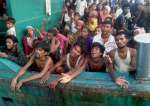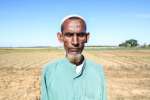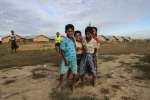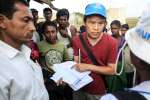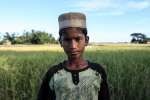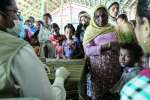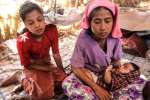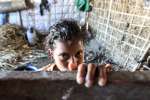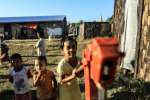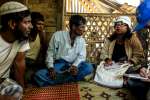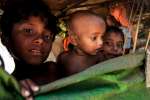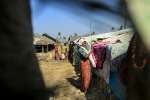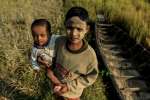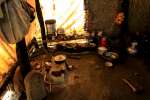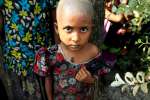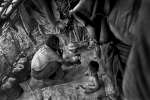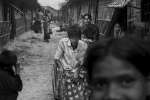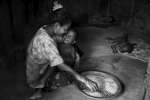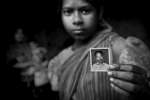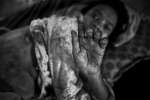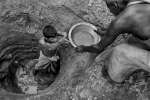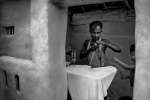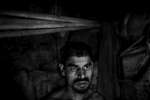- Text size
 |
|  |
|  |
| 
- Français
For these scouts, "camping" means coming home
News Stories, 29 September 2015
MAE LA CAMP, Thailand, Sept 29 (UNHCR) – They live by the motto, Be Prepared, as members of the Utah Boy Scouts of America Troop. But nothing could have prepared them for the rush of emotions that greeted them in Mae La refugee camp.
The 18 Myanmar refugee boys had flown with their scout leader from Salt Lake City in the United States to Japan for the World Scout Jamboree before arriving in Bangkok for a seven-hour bus ride to reach this camp in western Thailand's Tak province. They were visibly tired but excited as they scoured the crowd for familiar faces – loved ones they had not seen since leaving the camp in UNHCR's resettlement program almost 10 years ago.
The faces of Brothers Lwel Say, 16, and Lwel Gay Htoo, 14, lit up when they found their aunt, Tha Dah Wah, 24. "I'm very excited, very happy and I want to cry," she said. After seven years apart, the boys were now taller than her, but the younger one still clung to her hand as they walked through the camp.
The brothers have come a long way – not just in terms of distance but also experience. Born in exile, Mae La camp was the only world they knew. Daily life revolved around school, play and evening lessons with their teacher-mother. They wore old clothes full of holes and considered themselves lucky to wear flip flops where other kids ran around in their bare feet.
"We used to ask our parents – how will our future be? They always said they didn't know," said Lwel Gay Htoo.
Back then, ethnic conflict in south-eastern Myanmar seemed intractable and the refugees faced the prospect of spending a lifetime in Thailand's camps. In 2005, UNHCR started a group resettlement program to give some of them a new lease on life.
"My parents decided to register for the resettlement program because they hoped for better education for me and my brothers and sisters, so we would have better lives," said Eh Nay Ler, 17, another member of the visiting team.
Life in the United States was not easy at first. Many struggled with the new environment, culture and language. The Lwel brothers improved their English by watching cartoons while Eh Nay Ler persisted by listening to his teachers. These young men eventually joined the Utah Boy Scouts – comprising some 100 resettled Myanmar refugees – through which they volunteer weekly and help the homeless in their new community.
"Resettling in America gave is a new, fresh start in life. It's given us freedom, rights, better education and welfare that would have been impossible if we still lived in the camp. Without the resettlement program, I could have married early or gone bad," said Lwel Say, who admitted to being "totally stubborn" and "spoilt" in the past.
Eh Nay Ler agreed: "I am very thankful for the life I've been given. Without support from UNHCR, the resettlement country and donors, I would probably be picking corn for a living with my grandmother."
Despite their gratitude, the boys clearly missed the relatives they left behind, including grandparents who felt they were too old to travel and extended family members who had either opted to stay or were unregistered and thus not eligible for resettlement under Thai regulations.
The Lwel brothers' aunt chose to stay for a university scholarship in Thailand, after which she plans to teach in the camp.
This spirit of giving back is not lost on the resettled boys. Lwel Say hopes to come back to Mae La to be a teacher when he graduates from high school in two years.
Fellow Scout Hay Soe, 16, waxed nostalgic when he visited his old school in the camp: "One day I will come back here and be a teacher. I will teach math or science because I love these subjects and I want to work for refugees in Thailand."
Nearly 100,000 Myanmar refugees have been resettled to third countries such as Australia, Canada, Denmark, Japan and the United States since 2005. Some 110,000 remain in nine camps along the Thailand-Myanmar border.
By Korapin Suntayodom & Pathamawan Tonjunpong,
In Mae La camp, Thailand



